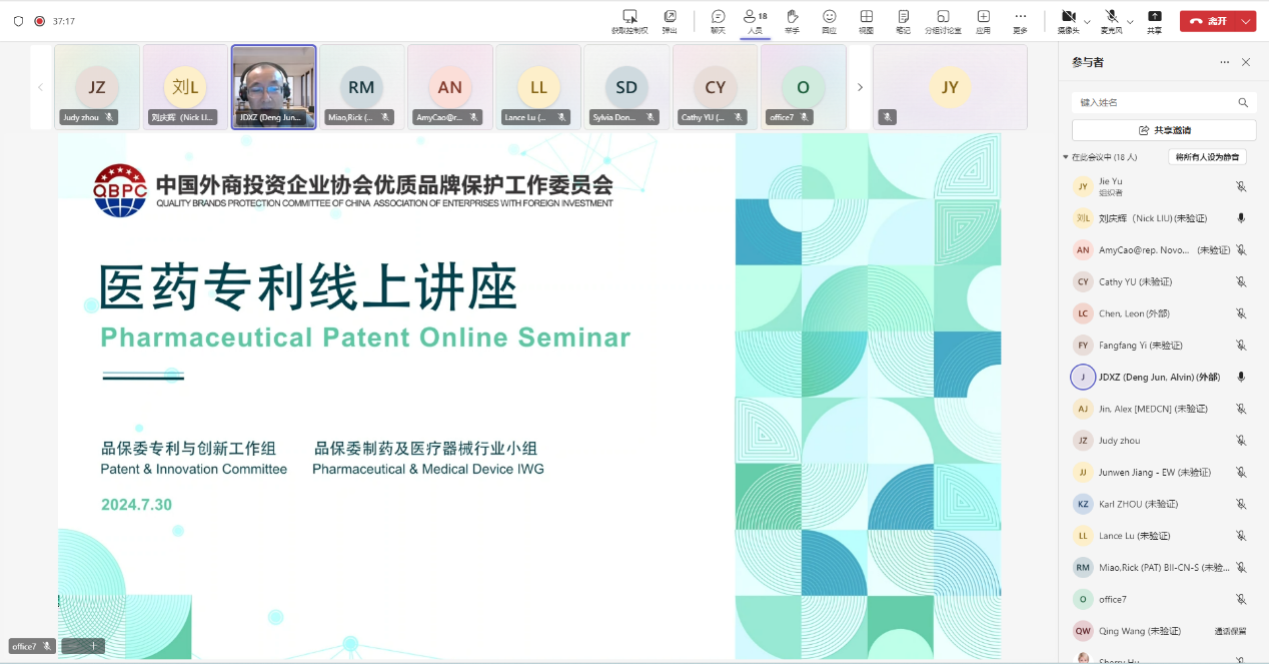On July 30, the QBPC Patent and Innovation Committee and Pharmaceutical & Medical Device IWG co-hosted an online seminar on pharmaceutical patents. Lawyer Nick Liu provided an in-depth explanation of the latest drug patent litigation progress and rules, as well as their implications for drug innovation. The event was hosted by PIC Vice Chair Alvin Deng, and more than 20 QBPC members attended.

First, regarding the practice and problems of drug patent linkage litigation, Nick thoroughly analyzed the early resolution mechanism of drug patent disputes and the challenges in actual operation. He explained trial reasoning and adjudication rules while listing precautions for OEMs to succeed in drug patent linkage cases. He pointed out that in practice, the court would generally examine the plaintiff's standing to sue before determining whether the generic drug fell within the scope of protection over the original drug’s patent. He also analyzed the trial reasoning and adjudication rules in detail through several case studies. As a conclusion, the producer of original drug should completely understand the trial reasoning, fulfill the obligation of proof, and try to fulfill the burden of proof and persuasion in order to ensure its success in litigation.
Regarding disputes on the determination of offering for sale of generic drugs, he shared the answer through case study. Currently, the generic drug manufacturers’ bidding for centralized drug procurement had been recognized as offering for sale, while the application for incorporating drug names into the catalog of medicines covered by the national medical insurance system had not.
Finally, Nick explained the examination, re-examination, and invalidation of drug patent applications, as well as the issue of supplementing experimental data in judicial processes. He introduced the Supreme People's Court’s most recent rules for reviewing cases involving supplementing experimental data and elaborated on the acceptance and admissibility of supplemental experimental data through case studies. When hearing drug patent linkage cases, the court's review principle was that the acceptance of supplemental experimental data must not jeopardize the principle of the first-to-file patent system and must not introduce technical contents that were not documented or disclosed in the original patent application documents. The review standard was that the acceptance of supplementary experimental data submitted by the parties must meet both positive conditions (i.e., the patent specification records or discloses the technical effect to be proved by the supplementary experimental data) and negative conditions (i.e., the supplementary experimental data submitted by the parties cannot be used to make up for the intrinsic defects of the original patent application document). He pointed out that supplemental experimental data in judicial practice should be handled in terms of examination, acceptance, and admissibility. All supplemental experimental data should be examined as evidence. As long as the data could meet the positive and negative conditions, it should be accepted; furthermore, if it could achieve the purpose of its proof, it should be admitted. Finally, he also listed the precautions for submitting supplemental experimental data.
